Stocks fall as Stock Mutual Fund Inflows Resume?
Stock-Markets / Stock Markets 2011 Jan 22, 2011 - 04:02 AM GMT Food Inflation Comes To America: General Mills, Kraft And Kellogg Hike Prices On Selected Food Products
Food Inflation Comes To America: General Mills, Kraft And Kellogg Hike Prices On Selected Food Products
(ZeroHedge) After denying for months that surging food prices will eventually come to the consumer, hoping that instead food companies could absorb the margin drop, sell-side research is finally capitulating to the reality of what is really happening in the retail store. In a note discussing General Mills, Goldman Sachs says the company raised prices on snack bars some 7% last week. Goldman further clarifies that "this reportedly followed a comparable increase taken by K on its snack bars in mid-December. In addition, KFT has reportedly announced a 6% increase on select Planters branded nut products. We expect more price increases to be announced by the food companies in the coming weeks.
China's Runaway Chariot
(oftwominds.com) China's authorities may have lost the ability to control the increasingly complex and opaque Chinese economy.
China's economy appears to have reached a critical threshold of complexity and obscurity that renders it uncontrollable. Recent reports of surging bank loans, real estate speculation, industrial growth and inflation triggered a sharp decline in the Shanghai stock index yesterday. A recent comparison of food prices in Boston and Beijing found that China is now more expensive than the US.
"Creative Accounting" Makes Fed Insolvency Impossible (ZeroHedge) To all who thought that the FASB gives leeway only to banks when fudging their numbers, and boosting their equity capital in ways previously unheard of, we have a surprise. The latest entrant in the "accounting gimmickry" club is none other than the Fed. And since the Fed is not auditable by anyone, it gives itself permission to change and bend the rules in any way it desires.
Stocks fall as Stock Mutual Fund Inflows Resume?
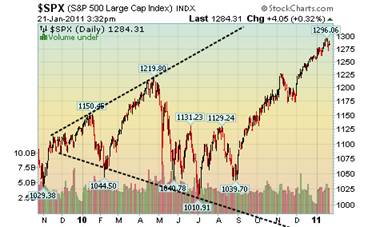 -- It is only fitting that the biggest equity sell off in stocks in almost 2 months should just after the largest equity mutual fund inflow in years (still leaving stock mutual funds in a net outflow position for the year). In the week ended January 12, domestic equity funds as reported by ICI saw an inflow of $3,765 million following last week's outflow of $4,229 (million). What is odd is it still makes it the largest inflow going back to 2009.
-- It is only fitting that the biggest equity sell off in stocks in almost 2 months should just after the largest equity mutual fund inflow in years (still leaving stock mutual funds in a net outflow position for the year). In the week ended January 12, domestic equity funds as reported by ICI saw an inflow of $3,765 million following last week's outflow of $4,229 (million). What is odd is it still makes it the largest inflow going back to 2009.
The Long Bond is Still in the Dumps.
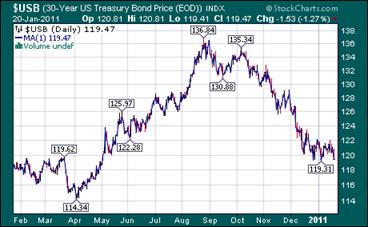 --Treasuries advanced, trimming a loss this month, as traders reduced bets on inflation in the U.S. economy for a second week. Demand fell at an auction of inflation-linked bonds yesterday, indicating investors don’t see a need to buy protection against rising prices in the economy. The difference between yields on 10-year notes and Treasury Inflation Protected Securities, a gauge of trader expectations for consumer prices, shrank to as little as 2.30 percentage points yesterday, the narrowest since Jan. 5.
--Treasuries advanced, trimming a loss this month, as traders reduced bets on inflation in the U.S. economy for a second week. Demand fell at an auction of inflation-linked bonds yesterday, indicating investors don’t see a need to buy protection against rising prices in the economy. The difference between yields on 10-year notes and Treasury Inflation Protected Securities, a gauge of trader expectations for consumer prices, shrank to as little as 2.30 percentage points yesterday, the narrowest since Jan. 5.
No Consensus on Outlook for Gold.
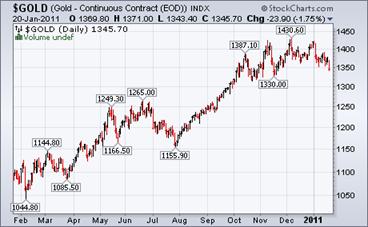 --Five of 11 traders, investors and analysts surveyed by Bloomberg, or 45 percent, said the metal will climb next week. Four predicted lower prices and two were neutral. Gold for February delivery was down 1.1 percent for the week at $1,344.90 an ounce at 11 a.m. yesterday on the Comex in New York. Futures, down 5.4 percent this year, headed for their third straight weekly decline on speculation that signs of economic recovery in the U.S. and European Union will reduce the need for a haven investment.
--Five of 11 traders, investors and analysts surveyed by Bloomberg, or 45 percent, said the metal will climb next week. Four predicted lower prices and two were neutral. Gold for February delivery was down 1.1 percent for the week at $1,344.90 an ounce at 11 a.m. yesterday on the Comex in New York. Futures, down 5.4 percent this year, headed for their third straight weekly decline on speculation that signs of economic recovery in the U.S. and European Union will reduce the need for a haven investment.
Japan’s Stocks Begin to Roll Over.
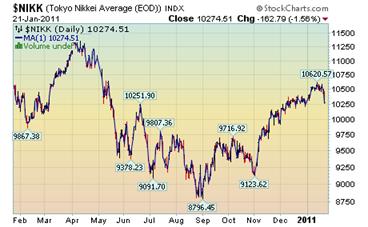 --Japanese stocks fell, with the Topix index posting its biggest weekly decline in about five months, as trading houses dropped amid declines in oil and metal prices on concern China will raise interest rates and cool demand. The Nikkei 225 Stock Average slipped 1.6 percent to 10,274.52 at the close of trading in Tokyo, reversing an earlier gain of 0.2 percent. More than 12 times as many stocks fell as rose on the Topix, which fell the most this week since the week ended Aug. 13.
--Japanese stocks fell, with the Topix index posting its biggest weekly decline in about five months, as trading houses dropped amid declines in oil and metal prices on concern China will raise interest rates and cool demand. The Nikkei 225 Stock Average slipped 1.6 percent to 10,274.52 at the close of trading in Tokyo, reversing an earlier gain of 0.2 percent. More than 12 times as many stocks fell as rose on the Topix, which fell the most this week since the week ended Aug. 13.
China Stocks Rebounded.
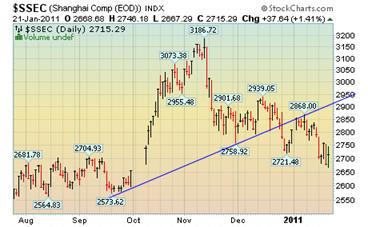 -- China’s stocks rebounded from the lowest close in almost four months as investors speculated recent declines were excessive and the nation’s biggest mutual fund company boosted its holdings in real-estate companies. The Shanghai Composite Index gained 37.6, or 1.4 percent, to 2,715.29 at the 3 p.m. close. The gauge, which tracks the bigger of China’s two stock exchanges, tumbled 2.9 percent yesterday, driving valuations to 12.5 times estimated earnings, near the weakest in two years.
-- China’s stocks rebounded from the lowest close in almost four months as investors speculated recent declines were excessive and the nation’s biggest mutual fund company boosted its holdings in real-estate companies. The Shanghai Composite Index gained 37.6, or 1.4 percent, to 2,715.29 at the 3 p.m. close. The gauge, which tracks the bigger of China’s two stock exchanges, tumbled 2.9 percent yesterday, driving valuations to 12.5 times estimated earnings, near the weakest in two years.
China Can Just Say “No” to the Dollar.
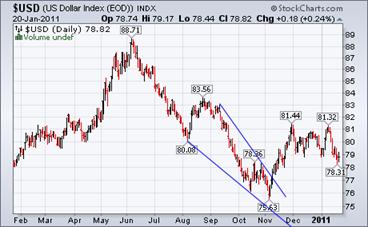 -- At a joint press conference to welcome Chinese President Hu Jintao to the U.S. on Jan. 19, President Barack Obama downplayed contentious issues, such as China’s undervalued currency, and focused instead on areas of economic cooperation. “We want to sell you all kinds of stuff,” Obama said. “We want to sell you planes, we want to sell you cars, we want to sell you software.”
-- At a joint press conference to welcome Chinese President Hu Jintao to the U.S. on Jan. 19, President Barack Obama downplayed contentious issues, such as China’s undervalued currency, and focused instead on areas of economic cooperation. “We want to sell you all kinds of stuff,” Obama said. “We want to sell you planes, we want to sell you cars, we want to sell you software.”
One thing not on his export list: inflation.
Government May Have Caused Overinvesting in Housing.
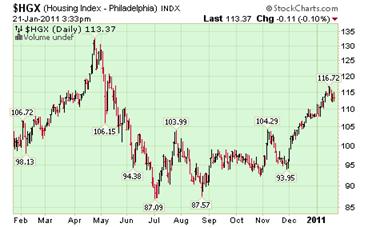 -- Conservatives blame poor government policy for causing the housing bubble, while progressives blame the financial industry. While most arguments on the right focus on the government-sponsored enterprises Fannie Mae and Freddie Mac, its stance actually might not need to rely on them. Data indicates that the government's broader efforts to make housing an attractive investment has funneled money away from business and into the housing sector.
-- Conservatives blame poor government policy for causing the housing bubble, while progressives blame the financial industry. While most arguments on the right focus on the government-sponsored enterprises Fannie Mae and Freddie Mac, its stance actually might not need to rely on them. Data indicates that the government's broader efforts to make housing an attractive investment has funneled money away from business and into the housing sector.
Have Gasoline Prices Topped?
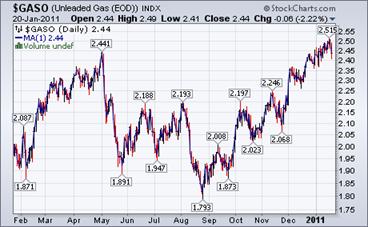 --The Energy Information Agency weekly report states, “In late December, the average national retail price of regular grade gasoline rose above $3 per gallon for the first time since October 2008. However, when gasoline sold for $3 per gallon in October 2008, gasoline prices were in the midst of a sharp decline that saw prices fall from a peak of $4.11 per gallon in July 2008 before bottoming-out at $1.61 per gallon in December 2008. Since then, prices have been on an upward trend.”
--The Energy Information Agency weekly report states, “In late December, the average national retail price of regular grade gasoline rose above $3 per gallon for the first time since October 2008. However, when gasoline sold for $3 per gallon in October 2008, gasoline prices were in the midst of a sharp decline that saw prices fall from a peak of $4.11 per gallon in July 2008 before bottoming-out at $1.61 per gallon in December 2008. Since then, prices have been on an upward trend.”
Natural Gas Consumption Moderated Last Week.
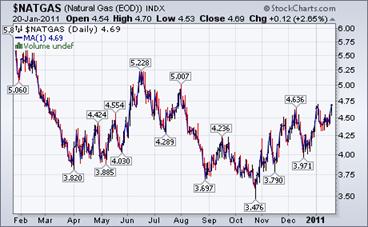 -- The U.S. Energy Information Administration reports, “Natural gas prices fell at most market locations, likely the result of weather moderating from cold temperatures last week and at the beginning of this report week. During the beginning of the report week, temperatures were very cold across most of the lower 48 States.”
-- The U.S. Energy Information Administration reports, “Natural gas prices fell at most market locations, likely the result of weather moderating from cold temperatures last week and at the beginning of this report week. During the beginning of the report week, temperatures were very cold across most of the lower 48 States.”
US Banks Reporting Phantom Income on $1.4 Trillion Delinquent Mortgages
(Forbes) The giant US banks have been bailed out again from huge potential writeoffs by loosey-goosey accounting accepted by the accounting profession and the regulators.
They are allowed to accrue interest on non-performing mortgages ” until the actual foreclosure takes place, which on average takes about 16 months.
All the phantom interest that is not actually collected is booked as income until the actual act of foreclosure. As a result, many bank financial statements actually look much better than they actually are. At foreclosure all the phantom income comes off the books of the banks.
Restaurants, Hotels, Cruise Lines Unable to Pass On Rising Food and Energy Prices.
(Mish) Energy, meat, vegetable and coffee prices are up. Pricing power is not. The result is a huge margin squeeze that affects profits at restaurants, hotels, cruise lines, and travel-related businesses in general. The Wall Street Journal picks up the story in As Food Prices Soar, Eateries Scramble
Soaring global food prices, particularly for meat, sugar and coffee, are putting pressure on the restaurant, travel and hotel sectors as they pursue a fragile recovery. In a bid to offset added costs without passing them on to price-sensitive consumers, many companies are scrambling to renegotiate contracts, find cheaper suppliers and reconfigure menus.
SHIBOR: We Have A BIG Liquidity Problem
(ZeroHedge) When two weeks ago we first pointed out the surging Chinese weekly SHIBOR (following up on comparable observations from last summer) it prompted a variety of bemused responses, the bulk of which were of the now traditional "this is irrelevant" variety. Too bad. Today, the 7 day SHIBOR (and repo rate) has just surged to new multi-year highs and has literally exploded from 2.5% to 7.3% in a few short days. Two weeks ago we said: "In a nutshell: there is no marginal liquidity left in the world's fastest growing economy. Eventually this will dawn on the world. Until then, BTFD." Looking at the SHCOMP's performance over the past two weeks, this has in fact dawned on the world. And when the headline scanning algos running our own stock markets realize that the world's biggest marginal economy has absolutely no short-term liquidity left, the aftermath will be very ugly.
Stunner: Gold Standard Fully Supported By... Alan Greenspan!?
(ZeroHedge) You read that right. After such establishment "luminaries" as World Bank president Robert Zoellick, Warren Buffett's father Howard, Jim Grant, and, most recently, Kansas Fed president Thomas Hoenig, all voiced their support for a return to a gold standard, the most recent addition to the motley group of contrite voodoo shamans is none othe than the man who is singlehandedly responsible for America's addiction to cheap toxic credit, who spawned such destroyers of the middle class as the current Chair(man), and who currently is the chief advisor in John Paulson's crusade to gobble up every ounce of deliverable physical in the world: former Fed Chairman - Alan Greenspan! In an interview with Fox Business, the man who refuses to go away into that good night: "We have at this particular stage a fiat money which is essentially money printed by a government and it's usually a central bank which is authorized to do so. Some mechanism has got to be in place that restricts the amount of money which is produced, either a gold standard or a currency board, because unless you do that all of history suggest that inflation will take hold with very deleterious effects on economic activity... There are numbers of us, myself included, who strongly believe that we did very well in the 1870 to 1914 period with an international gold standard."
The Ten Things That Would Make David Rosenberg Bullish On America
(ZeroHedge) David Rosenberg submits a list of the ten things that would make him bullish on the US economy. As precisely zero of these have a snowball's chance in hades of happening, we are not too concerned about Rosie leaving the "realist" fold any time soon.
I refuse to be labelled a perma-bear even if I have been bearish for a long time. Having been a bull in the 80s and 90s I do know what it feels like to wear rose-coloured glasses. But the reality is that U.S. policy has been adrift for over a decade and it looks like all we have are measures that merely kick the can down the proverbial road. So it looks like 2012 will be the critical inflection point if there is one, not unlike, hopefully, what 1980 ushered in which was a complete about-face from the ruinous policies dating back to the early 1970s. What we have on our hands right now is a recovery built of straw instead of bricks. An economic expansion and bull market built on rampant expansion of the Fed and Federal governments’ balance sheet is neither sustainable nor desirable. I am desperately looking for reasons to turn more optimistic, but to do so, some major policy shifts have to take place, like the ones above (see Article).
Traders alert: The Practical Investor is currently offering the daily Inner Circle Newsletter to new subscribers. Contact us at tpi@thepracticalinvestor.com for a free sample newsletter and subscription information.
Our Investment Advisor Registration is on the Web
We are in the process of updating our website at www.thepracticalinvestor.com to have more information on our services. Log on and click on Advisor Registration to get more details.
If you are a client or wish to become one, please make an appointment to discuss our investment strategies by calling Connie or Tony at (517) 699-1554, ext 10 or 11. Or e-mail us at tpi@thepracticalinvestor.com .
Anthony M. Cherniawski, President and CIO http://www.thepracticalinvestor.com
As a State Registered Investment Advisor, The Practical Investor (TPI) manages private client investment portfolios using a proprietary investment strategy created by Chief Investment Officer Tony Cherniawski. Throughout 2000-01, when many investors felt the pain of double digit market losses, TPI successfully navigated the choppy investment waters, creating a profit for our private investment clients. With a focus on preserving assets and capitalizing on opportunities, TPI clients benefited greatly from the TPI strategies, allowing them to stay on track with their life goals
Disclaimer: The content in this article is written for educational and informational purposes only. There is no offer or recommendation to buy or sell any security and no information contained here should be interpreted or construed as investment advice. Do you own due diligence as the information in this article is the opinion of Anthony M. Cherniawski and subject to change without notice.
Anthony M. Cherniawski Archive |
© 2005-2022 http://www.MarketOracle.co.uk - The Market Oracle is a FREE Daily Financial Markets Analysis & Forecasting online publication.



